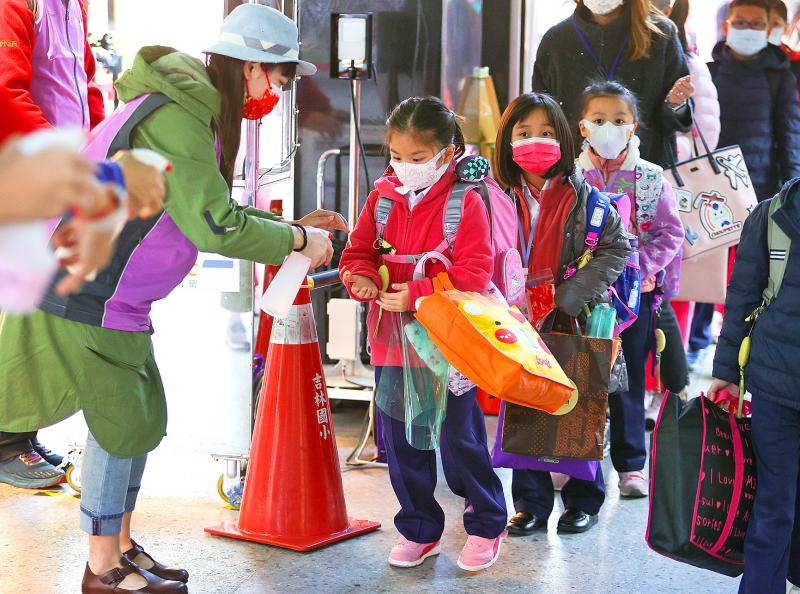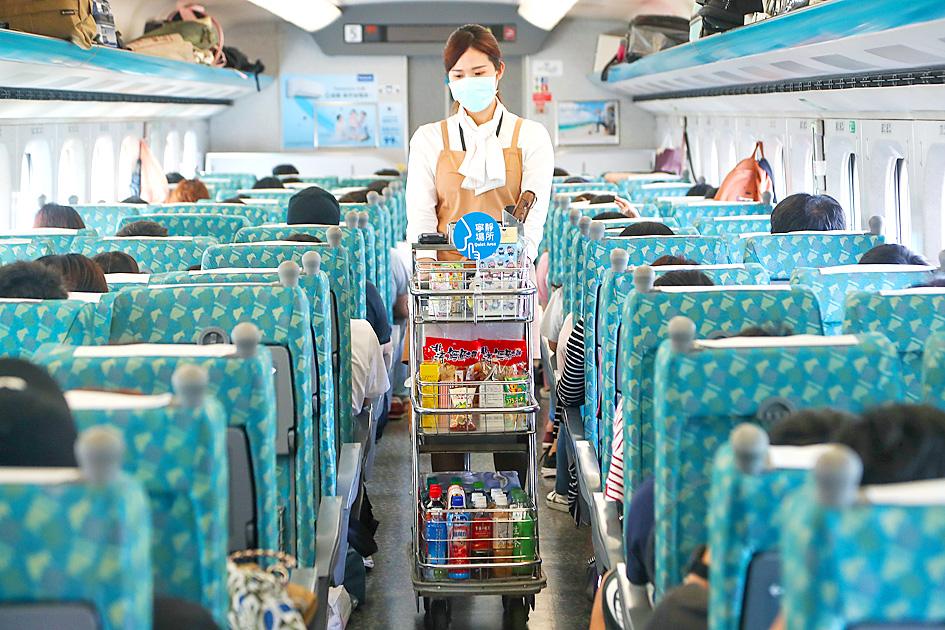The government’s autumn-winter COVID-19 prevention program is to continue beyond Sunday, but eating and drinking on high-speed trains would be allowed from Monday, the Central Epidemic Command Center (CECC) announced yesterday.
Minister of Health and Welfare Chen Shih-chung (陳時中), who heads the center, said that while there were no new confirmed cases in Taiwan yesterday, the global COVID-19 situation remains serious, so the autumn-winter COVID-19 prevention program would be extended beyond its Sunday deadline.
“Border control measures, including requiring a negative polymerase chain reaction test result obtained within three days of boarding a plane to Taiwan, and undergoing quarantine in a designated hotel, centralized quarantine facility or one person per housing unit if at home, will continue to be implemented,” he said.

Photo: CNA
Wearing a mask in eight types of public venues would also be required, and healthcare professionals would continue to adopt the expanded standards for reporting suspected COVID-19 patients for testing, Chen said.
High-speed rail passengers would still be required to wear a mask when not eating or drinking, he added.
Reporters asked Chen about a remark by online news outlet My-Formosa.com president Wu Tzu-chia (吳子嘉) during a radio interview yesterday that the CECC negotiated with Jacobson Medical (Hong Kong) Ltd (雅各臣香港) to purchase Pfizer-BioNTech COVID-19 vaccines in December last year.

Photo: CNA
Chen said that Jacobson Medical on Sept. 18 last year expressed its wish to negotiate a deal, so the center asked it to provide an authorization document, and TTY Biopharm Co Ltd (台灣東洋藥品) offered a 14-day limited authorization from Nov. 9 last year.
However, as the center could not reach an agreement with TTY Biopharm Co before the deadline, negotiations could not continue, he said.
Chen said that the CECC also replied to Jacobson Medical in Taiwan, expressing its thanks to Jacobson Medical Hong Kong for providing information about the vaccines, but as it did not provide a legal authorization document, negotiations could not continue, he said.
Chen said the center held six meetings with BioNTech in August last year and twice in November, through e-mails and conference calls.
Centers for Disease Control (CDC) Deputy Director-General Chuang Jen-hsiang (莊人祥), who is the CECC’s spokesman, said BioNTech contacted the CDC on Nov. 11 last year, and five teleconferences were held in November and December.
No other company attended the meetings, he said.
Separately yesterday, as students returned to their classrooms, the Taipei City Government said that 285 campuses in the city had completed disinfection and up to a year’s worth of epidemic prevention supplies had been stocked at the schools.
Taipei Municipal Yongchun Senior High School said it has replenished its mask stocks and gave seven masks to each student as a back-to-school gift.
Several universities also launched disease prevention measures for the new semester starting this week.
Soochow University has launched an e-sticker system for contact information registration at its campus entrances, while National Chengchi University and National Taiwan Normal University are enforcing access controls and real-name registration at their campus entrances.
Additional reporting by CNA

ROLLER-COASTER RIDE: More than five earthquakes ranging from magnitude 4.4 to 5.5 on the Richter scale shook eastern Taiwan in rapid succession yesterday afternoon Back-to-back weather fronts are forecast to hit Taiwan this week, resulting in rain across the nation in the coming days, the Central Weather Administration said yesterday, as it also warned residents in mountainous regions to be wary of landslides and rockfalls. As the first front approached, sporadic rainfall began in central and northern parts of Taiwan yesterday, the agency said, adding that rain is forecast to intensify in those regions today, while brief showers would also affect other parts of the nation. A second weather system is forecast to arrive on Thursday, bringing additional rain to the whole nation until Sunday, it

LANDSLIDES POSSIBLE: The agency advised the public to avoid visiting mountainous regions due to more expected aftershocks and rainfall from a series of weather fronts A series of earthquakes over the past few days were likely aftershocks of the April 3 earthquake in Hualien County, with further aftershocks to be expected for up to a year, the Central Weather Administration (CWA) said yesterday. Based on the nation’s experience after the quake on Sept. 21, 1999, more aftershocks are possible over the next six months to a year, the agency said. A total of 103 earthquakes of magnitude 4 on the local magnitude scale or higher hit Hualien County from 5:08pm on Monday to 10:27am yesterday, with 27 of them exceeding magnitude 5. They included two, of magnitude

CONDITIONAL: The PRC imposes secret requirements that the funding it provides cannot be spent in states with diplomatic relations with Taiwan, Emma Reilly said China has been bribing UN officials to obtain “special benefits” and to block funding from countries that have diplomatic ties with Taiwan, a former UN employee told the British House of Commons on Tuesday. At a House of Commons Foreign Affairs Committee hearing into “international relations within the multilateral system,” former Office of the UN High Commissioner for Human Rights (OHCHR) employee Emma Reilly said in a written statement that “Beijing paid bribes to the two successive Presidents of the [UN] General Assembly” during the two-year negotiation of the Sustainable Development Goals. Another way China exercises influence within the UN Secretariat is

Taiwan’s first drag queen to compete on the internationally acclaimed RuPaul’s Drag Race, Nymphia Wind (妮妃雅), was on Friday crowned the “Next Drag Superstar.” Dressed in a sparkling banana dress, Nymphia Wind swept onto the stage for the final, and stole the show. “Taiwan this is for you,” she said right after show host RuPaul announced her as the winner. “To those who feel like they don’t belong, just remember to live fearlessly and to live their truth,” she said on stage. One of the frontrunners for the past 15 episodes, the 28-year-old breezed through to the final after weeks of showcasing her unique